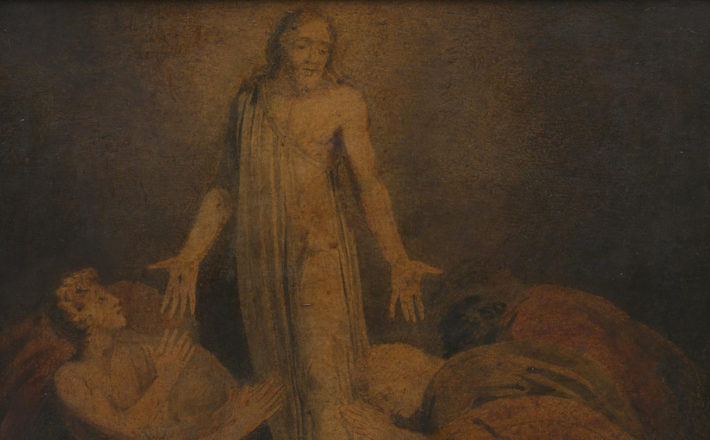Commentary on Psalm 4
Psalm 4 is the second of five individual laments of David that appear at the beginning of Book 1 of the Psalter. Commentators cite the many links between Psalm 4 and Psalm 3, which, in its superscription, is placed firmly within the life story of David—“A Psalm of David when he fled from his son Absalom.”1 In Psalm 3, David laments the many foes rising up against him, but states with confidence that the Lord is a shield, his glory, and the one who lifts up his head. David can, therefore, with confidence lie down and sleep and wake again with no fear.
Psalm 4 indeed seems an apt follow-on to Psalm 3. It opens with a familiar lamenting petition: “Answer me …” (see Psalms 13:3; 55:2; 108:6; 143:7). The psalm singer continues by reminding God that at some point in the past God provided “room” (New Revised Standard Version Updated edition), perhaps better translated as “a wide space.” One commentator suggests a translation of “I was in a tight spot and you provided space for me to move and breathe.” As we find in many individual lament psalms, the psalm singer is asking God for help, reminding God that God has provided that help in the past.
The singer of Psalm 4 continues, “Be gracious to me, and hear my prayer.” Like “answer me,” “be gracious to me” (or “show favor to me”) is a common lamenting petition (see Psalms 9:13; 25:16; 30:10), along with “hear my prayer” (see Psalms 39:12; 54:2; 102:1; 143:1). The psalm singer cries out to God, asking to be heard and to be dealt with favorably.
In verse 2, the psalmist addresses the people (“the sons of man,” perhaps “you mere mortals”—see the book of Ezekiel’s reference to Ezekiel as “the son of man”—“mortal” in the NRSVue) with words usually addressed to God in lament psalms: “How long?” (see Psalms 13:1; 79:5; 89:46). How long will these people spread lies (empty words) about me and compromise my honor? The psalm singer continues addressing the people in verse 3, stating with confidence that the Lord hears when the psalmist calls.
Commentators disagree on the audience of the words of verses 4–7 of Psalm 4. If the psalm singer is speaking to themself, the words are a reminder of the peace that God has granted in the past amid inner and outer turmoil. The word translated at the end of verse 4 in the NRSVue as “be silent” can also be translated as “take a deep breath.” If the psalm singer is speaking to the oppressors, the words admonish them to avoid the sin that tempts them; to ponder it upon their beds, take a deep breath, and trust in God. In verse 6, the psalmist expresses a heartfelt wish that the light of God’s face would shine on humanity.
Psalm 4 concludes in verses 7–8 with the psalm singer celebrating God’s good provisions: gladness, more so than when grain and wine abound, and a good night’s sleep in the safety of God’s watchful eye. These closing words echo those of verse 5 of Psalm 3: “I lie down and sleep; I wake again, for the LORD sustains me.”
We might be permitted to read Psalm 4 as the further words of the singer of Psalm 3. The psalmist has endured oppression and slander. In Psalm 3:1–2, the singer cries out to God: “Many are rising against me; many are saying to me, ‘There is no help for you in God.’” But in 3:4, the psalmist states, “I cry aloud to the LORD, and he answers me from his holy hill.” God has answered the psalmist’s plea, and in Psalm 4:1 we read, “You gave me room [a wide space] when I was in distress.”
Thus, the singer, with the knowledge of God’s past provision, is confident enough to address the oppressors and foes directly in verses 2–3: “How long, you people, shall my honor suffer shame? How long will you love vain words, and seek after lies? But know that the LORD has set apart the faithful for himself; the LORD hears when I call to him.” Further, the psalmist seems to be concerned for the welfare of the oppressors in verses 4–5: “When you are disturbed, do not sin; ponder it on your beds, and be silent [take a deep breath]. Offer right sacrifices, and put your trust in the LORD.”
How might we understand the intention, the direction of this heartfelt psalm and, in particular, incorporate it into our understanding of the post-resurrection mindset that we bring to this time in the liturgical calendar? In the other liturgical readings for this Sunday, Jesus meets with and shares a meal with the disciples after his resurrection (Luke 24); Peter has healed someone and then speaks to the gathered community (Acts 3); and the writer of 1 John admonishes us to live rightly (1 John 3).
As we confront those who seek to slander or oppress us, may we first cry out to God for direction and peace (to lie down and sleep and wake with God’s sustaining care). Then, in faithful compassion, may we ask those who oppress to ponder it on their beds, take a deep breath, and seek their own peace with God.
Notes
- See 2 Samuel 15 for the narrated story.



April 14, 2024